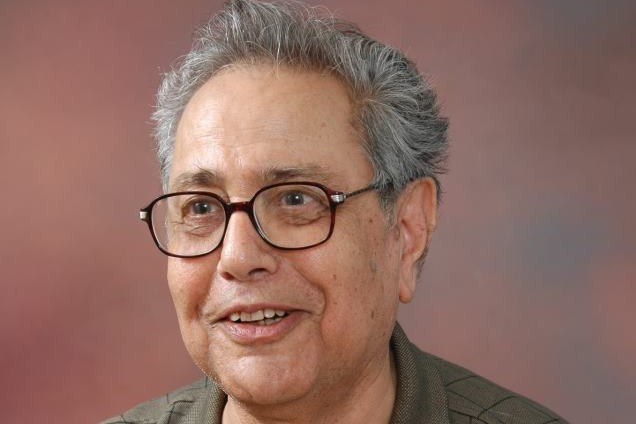Around 1985 when I took up a teaching position with the Southeastern University, Washington D.C., I was given an English course that had “The Norton Anthology of Poetry” (2182 pages) as the students’ textbook. I could choose my course material from this voluminous book. Of living American poets, the ones I chose included John Updike. A year junior to me in age, he was a celebrity in America because he had given to the corpus of American poetry something that it lacked, namely religious fervor.
A short piece of his that I came across in the book was titled I missed his book but read his name. It seemed to have been written in a light mood and castigated a common name from India. Mr. M. Anantanarayanan, a novelist had published his novel “The Silver Pilgrimage” and The New York Times had taken notice of it. John Updike dwelt jocularly upon the unpronounceable name in his poem. Here is the poem.
Though authors are a dreadful clan
To be avoided if you can
I’d like to meet the Indian, M. Anantanarayanan.
I picture him as short and tan.
We’d meet, perhaps, in Hindustan.
I’d say, with admirable elan
“Ah, Anantanarayanan.
I have heard of you. The Times once ran
A notice of your novel, an
An unusual tale of God and Man.”
Would seat me on a lush divan
And read his name – that sumptuous span
Of “a’s and “n’s more lovely than
“In Xanadu did Kubla Khan”.
Aloud to me all day, I plan
Henceforth to be an ardent fan
Of Anantanarayanan –Anantanarayanan.
This poem rankled in my mind and I thought I would get even with him by writing my own poem addressed to him. I did, and to top it all, whenever I taught his poem in the classroom, I read out my own poem as well, to the great delight of my students.
Well, here is my poem.
TO JOHN UPDIKE
(In response to his poem belittling M. Anantanaraynan)*
John Updike suffers unashamedly
Of dysentery, the ubiquitous result of being
A Caucasian with a twisted tongue, words flowing
From both his ends.
What is so difficult man, to pronounce
A hallowed name that means God Almighty?
You call authors ‘a dreadful clan
To be avoided if you can.’
But Anantanarayanan
You would like to keep confined to Hindustan.
Picture yourself with the man who’s a marvel
He ‘as short and tan’; you ‘as tall and marmoreal’.
And you say you do now plan to be his life-long ardent fan.
You’d seat him, you say, on a lush divan
More luscious than one in Zanadu of Kubla Khan
And then practice saying again and again
All the “a”s and “n”s together, crazy or sane.
I know, John, you’re fond of names
Wigglesworth and Killpatrick and Hughshumphrey
They enter your poems all and sundry
So be at ease, the offense is taken anon
By me or by Anantanaryanan.
The chance to talk to him came pretty late in my life as I got involved in my domestic affairs. However, a couple of years before his death, (He died on January 27, 2009), I left a message with his secretary that I would like to meet him for a few minutes. He called me on phone and said he would be happy to meet a fellow poet from India. The date, time, and place were settled. I had to meet him in the office of The New Yorker, and from there, he said we would go for a drink and a bite. Our meeting was a great success. I found him a jocular person, ever ready to laugh. When I referred to his poem, he said that he had read this unpronounceable name in The New York Times and was so given to the nasal twang that he practiced pronouncing it. When he couldn’t, he wrote the poem but it was not done to belittle the gentleman whom he had never met.
Anyway, I told him that I had written a poem addressed to him. He was intrigued. He told me he had never had anyone write a poem addressed to him. A drink or two later, I read out the poem. He laughed at almost every line of it. When his laughter subsided, he said, “Come on Satyapal, let’s have a wager. If you can pronounce the gentleman’s name five times without stuttering or stopping, I will give you twenty dollars. If you can’t, you will give me fifty.” I got the catch. “Don’t act the Jew with me, John,” I said, “Twenty it is for both of us.” He laughed. “All right, let’s act Hindu with each other. Twenty it is each way.”
It is an interesting story, but the fact of the matter is that I lost the bet. The first two times I succeeded but at the third time, I stuttered and lost the momentum to pronounce Anantanarayanan in one breath. I would say Ananta and then pause for a mini-second before continuing with Narayanan. He was happy with himself. He said, “Let me sign your poem so that you have a record that I approved of it.” He signed the poem with my pen. I have treasured the piece of paper ever since. I am not reproducing his signatures here for obvious reasons.



